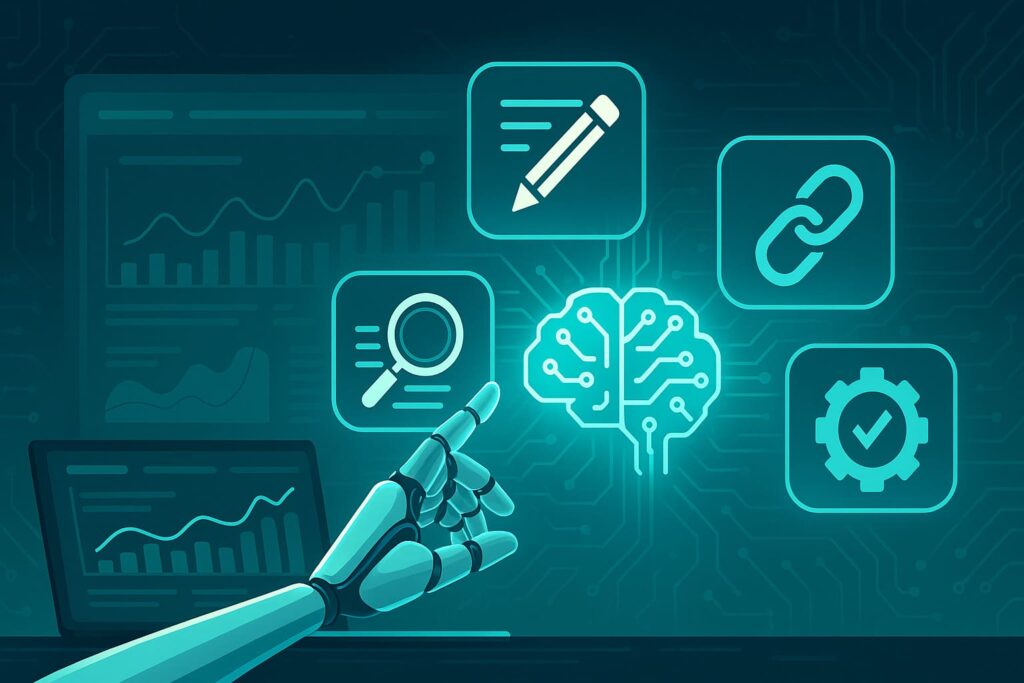In today’s digital marketplace, artificial intelligence (AI) is revolutionizing how websites rank, how content is discovered, and how businesses attract customers online. For Canadian business owners, SEO newbies, and marketing agencies alike, grasping the role of AI in search engine optimization can feel overwhelming. This post breaks down complex ideas into simple, conversational language, showing you why AI matters, how it’s changing SEO, and what steps you can take to harness its power.
What Is AI in SEO and Why It Matters
AI refers to computer systems that learn from data, recognize patterns, and make decisions with little human intervention. In SEO, AI technologies such as machine learning, natural language processing (NLP), and automation reshape every stage of your digital strategy.
The Shift from Keywords to Intent
Traditionally, SEO focused on exact-match keywords. AI-driven search engines like Google’s RankBrain and BERT now prioritize user intent—what the searcher wants to accomplish—over simple keyword matching. That means your website must address real questions, related topics, and context, rather than just repeating a single phrase.
Personalized Search Experiences
AI analyzes browsing behavior, location, and device type to deliver personalized search results. For local Canadian businesses, this means search engines learn which Montréal bakeries or Vancouver plumbing services to recommend based on user patterns, boosting relevance and improving click-through rates.
How AI Is Changing Core SEO Tasks
AI doesn’t replace human expertise; it augments it by automating repetitive tasks and providing data-driven insights. Here are key areas where AI makes a difference:

1. Keyword Research and Topic Discovery
AI-powered tools scan millions of search queries to uncover semantic relationships, long-tail variations, and trending topics.
- Related Terms Extraction: Machine learning uncovers synonyms, LSI keywords, and entity relationships (e.g., “organic coffee” and “fair trade beans”).
- Trend Forecasting: Predictive analytics show which topics are rising in popularity, helping you plan timely content.
- Content Gap Analysis: AI compares your content to top-ranking pages, highlighting missing subtopics to cover.
2. Content Creation and Optimization
From drafting meta descriptions to suggesting headings, AI tools streamline the writing process.
- Automated Briefs: Tools like Frase and Clearscope generate outlines based on top-ranked articles.
- Readability Scoring: Natural language processing evaluates tone, sentence length, and complexity to ensure clarity for both novices and experts.
- On-Page SEO Suggestions: AI recommends where to place keywords, related phrases, and internal links to enhance semantic relevance.
3. Technical SEO and Site Performance
AI helps identify and fix backend issues that affect crawling, indexing, and user experience.
- Crawl Error Detection: Automated site audits catch broken links, missing metadata, and redirect loops.
- Page Speed Optimization: Machine learning tools analyze load times, suggest image compression, caching strategies, and code minification.
- Mobile-First Indexing: AI simulates various devices to ensure responsive design and fast mobile performance.
4. Link Building and Outreach
Building high-quality backlinks remains vital. AI accelerates research and outreach personalization.
- Prospect Scoring: Algorithms rank potential link sources by domain authority, topical relevance, and outreach willingness.
- Email Personalization: Natural language templates adapt to each prospect’s industry, increasing response rates.
- Monitoring and Alerts: Automated systems track new mentions of your brand or keywords, helping you secure unlinked references.
How to Start Leveraging AI for Your SEO Strategy
You don’t need a PhD in data science to get started. Follow these practical steps to integrate AI into your workflow:
Step 1: Choose the Right AI-Powered Tools
Select platforms that match your needs and budget. Popular options for Canadian businesses include:
- Content Optimization: Clearscope, Surfer SEO
- Technical Audits: DeepCrawl, Sitebulb
- Keyword Research: Ahrefs with its AI-driven “Content Explorer”
- Rank Tracking: Semrush Sensor and Position Tracking
Step 2: Train Your Team on AI Workflows
Ensure everyone understands:
- Tool capabilities: What each AI feature does and its limitations.
- Data interpretation: How to read reports, dashboards, and recommendations.
- Ethical use: Avoid over-reliance on AI-generated text; always add human insight and fact-checking.
Step 3: Combine AI Insights with Human Creativity
AI excels at data crunching but can’t replace your unique expertise and storytelling skills. Use AI to:
- Identify content gaps you might overlook.
- Generate first drafts or outlines, then refine with your brand voice.
- Analyze user feedback and iterate based on real engagement metrics.
Step 4: Monitor, Test, and Iterate
SEO is an ongoing process. Use AI analytics to track performance:
- A/B Test Headlines: See which titles drive more clicks.
- User Behavior Analysis: Heatmaps and session recordings reveal where users drop off.
- Rank and Traffic Tracking: Automated alerts notify you of sudden changes in SERP positions.
The Future of AI in SEO
As AI continues to evolve, anticipate deeper integration of voice search optimization, visual search, and predictive analytics. Canadian businesses ahead of this curve will benefit from improved local visibility, niche targeting, and faster adaptation to algorithm shifts.
- Voice-Activated Queries: Optimize for conversational phrases and question-based content.
- Image Recognition SEO: Use structured data and optimized alt text for visual search on platforms like Google Lens.
- Predictive Content Marketing: AI could soon forecast which topics will trend next quarter, letting you publish first.
Read Also : How AI and Machine Learning are Shaping SEO: What Canadian Businesses Need to Know
Conclusion
AI is not just a buzzword—it’s a transformative force in search engine optimization. By understanding how AI reshapes keyword research, content creation, technical audits, and link building, Canadian business owners, SEO beginners, and agencies can craft smarter strategies that cater to both semantic search engines and real human readers.
About the Author

Rajesh Jat
SEO Specialist at ImmortalSEO with expertise in technical SEO and content optimization.
View all posts